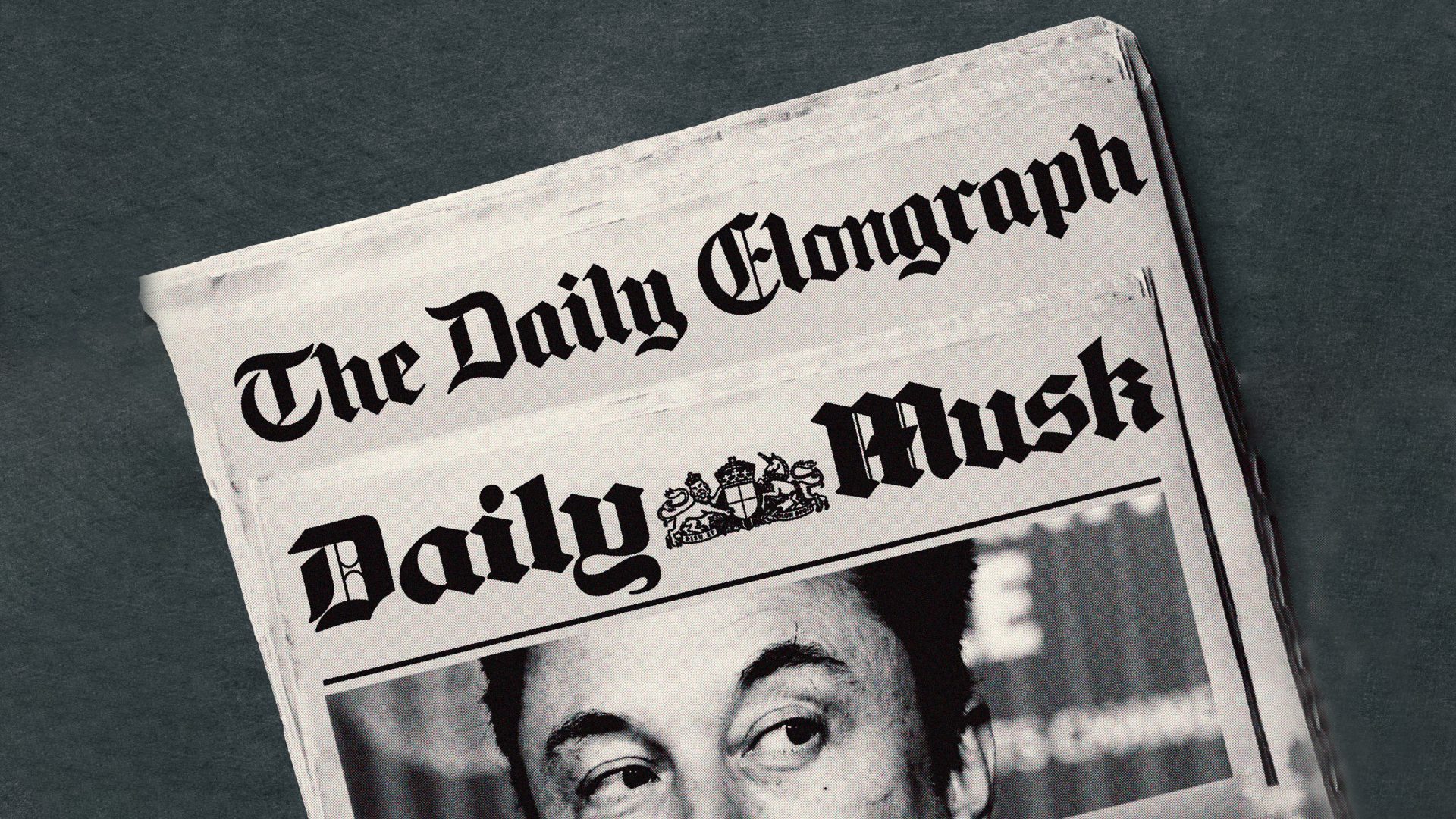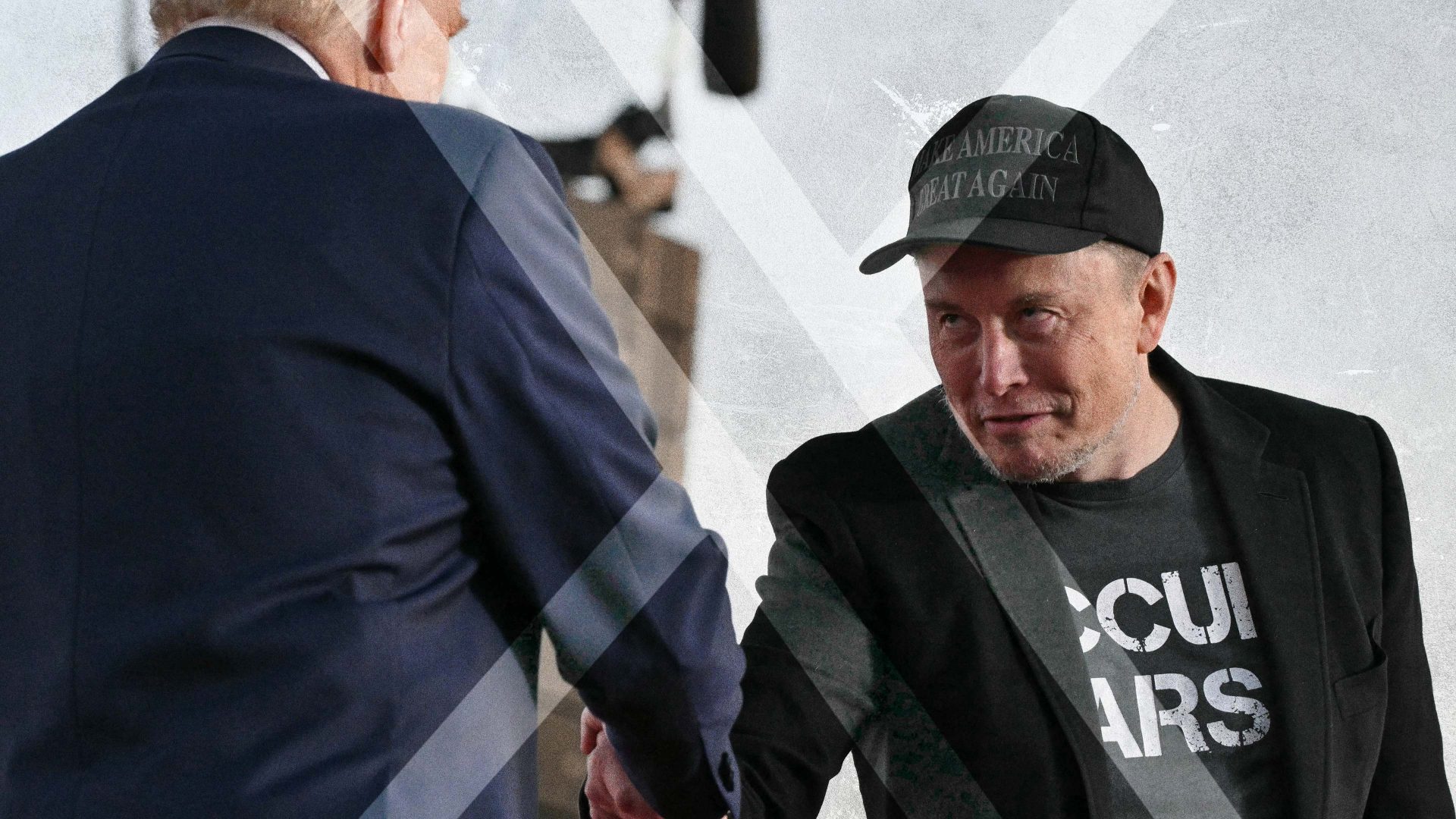If Britain wants its future to look like America post-January 20 – a loose cannon nation at the whim of neofascist man-babies – then it only has to do one thing: Nothing.
All too many in the UK’s media and commentariat are willingly acting as handmaidens, ready to deliver our own Donald Trump, our own Elon Musk, our own MAGA.
Elon Musk’s obsessive and cynical exploitation of the “grooming gangs” issue might have led to a schism with his previous best friend in UK politics, Nigel Farage, but the Daily Telegraph and Mail are already showing themselves all too willing to carry his water.
The rise of Trump through 2015 and 2016 might have taken the clueless Democratic political establishment – and most of the equally hapless US media – by surprise, but it certainly didn’t come from nowhere. There were warning signs of the direction of travel in America for at least a decade before, not least through the role played by the right wing and mainstream information ecosystems.
Talking points would be born on social media (or extremist forums like 4chan), the more successful would be picked up by far right and conspiratorial media outlets like InfoWars or Breitbart, and then polished into something approaching respectability by Fox News – with the most outlandish claims removed, and statements replaced with questions.
Once Republican politicians turned the Fox News story into attack lines, the mainstream American press would feel obliged to cover the story prominently. Democrats would be unable to turn any real scandal into a story, while Republicans could produce outrage after outrage and generate blanket attention towards it.
This is the machine that gave us the Obama birther scandal, Hillary Clinton’s emails, Benghazi, Pizzagate, QAnon and more. Some were real political stories blown out of all proportion and context – and made incomprehensible and irrebuttable to audiences not buried in the conspiratorial detail they took on – while others were simply conspiracy theories given a veneer of respectability.
Fox News essentially engaged in conspiracy laundering, packaging up extremist and corrosive narratives into the political mainstream, and weaponising them against the Democrats. Trump’s rise in 2016 was the inevitable product of this process: in many ways, he is a president designed and created by it – Trump himself was radicalised in that decade-long process.
Even amid the worst extremes of the Brexit debate, the UK has remained largely insulated from that process – until now. While the UK has had just as much of a conspiratorial, extremist online fringe, their insanities have generally been kept to the corners of the internet. Now, the world’s richest man is launching an all-out war on the UK’s mainstream – and figures in UK politics and its media are cheering him on, in the hope it will work out well for them.
Previously, the mainstream right, both the Conservative frontbench and most of the media, had little interest in picking up extreme online narratives, which combined with the dominance of the BBC and public service broadcasters kept the UK’s information ecosystem mercifully cleaner than its rivers.
As the last week has shown all too clearly, in 2025 our luck has run out. US-style conspiracy laundering is acting in full force in the UK – what starts with Musk and Tommy Robinson is laundered through Reform and Conservative MPs, GB News and the Telegraph, and is dominating mainstream coverage.
The scandal of rape gangs in northern towns – many cases now over a decade old and widely covered by mainstream media – threatens to become Benghazi and Pizzagate all rolled into one, cutting a swathe through Labour and the mainstream body politic, and they are woefully unprepared.
Musk might be the most visible sign of the problem, but in a sense he is the most distant threat – it is the willingness of mainstream or mainstream-adjacent politicians and commentators to push his agenda into the narrative that will warp our politics. It is new, it is dangerous, and if Labour’s politicians don’t do better than the Democrats in dealing with it, they will face a similar fate to their cross-Atlantic counterparts.
Musk himself is not a mystery, nor is he an unknown quantity: the world’s richest man is an open neofascist. He has embraced far right conspiracy theories, spread racist and weaponised disinformation, regularly interacted with extremist and even neo-Nazi accounts on the social media network he controls, and worse. It is not borderline and it is not new: in 2023 he spread an antisemitic conspiracy theory that had motivated a mass shooting at a US synagogue. Anti-hate organisations have tracked hundreds of incidents of Musk boosting and sharing false, extremist content.
Anyone boosting Elon Musk in 2025 cannot plead ignorance. Who he is, and the agenda he is pushing, are out in the open – and yet he is not short of allies in the UK. In the case of Nigel Farage, the motivation is fairly obvious: Farage thought there is the potential for millions of pounds of funding from the world’s richest man, as well as another route into being pals with Donald Trump. Despite his weeks of toadying to Musk, Farage was swiftly and unceremoniously cut adrift when he wouldn’t echo Musk exactly.
Farage will be hoping, almost certainly in vain, that this rift can be healed as quickly as it appeared. If it can’t, Musk goes from potentially being the electoral asset of his dreams – an unlimited pot of money with a social network to boot – to a thorn in his side. Musk could foment internal tensions, cause a schism in the party, fund Robinson directly, or make Reform’s rise harder in any one of dozens of ways.
But Farage is not alone in being willing to dance to Musk’s tune. The UK’s right wing papers and now right wing channel GB News are happy to join in. It has been giving regular air time to Musk’s father Errol – even further to the right than Elon (and estranged from him) – who popped up last week to declare that Keir Starmer would be out of No 10 by February.
The reason the activities of so-called “grooming gangs” in northern towns are back in the news is entirely Musk – when Jess Phillips, as safeguarding minister, decided to defer the matter of a public inquiry back to the relevant local council a few weeks ago, any UK newspaper could have made a big story of it back then, and chose not to do so. Last Friday, Musk posted that “Starmer was complicit in the RAPE OF BRITAIN… he must face charges for his complicity in the worst mass crime in the history of Britain”. Of Phillips, he simply said she was “a rape genocide apologist”.
Instead of condemning Musk’s dangerous rhetoric, the following day the Daily Mail decided to adopt it with a front-page splash headline: ”STARMER ‘GUILTY AS ANYONE’ OVER GROOMING GANGS”. A paper that on other occasions expresses great – but presumably insincere – concern over political violence is happily fanning the flames.
But it is the Telegraph, even more than the Mail, that has embraced the Musk agenda – some staff believe this is in the hope that the billionaire might swoop in and buy the paper, which has been hanging around on the auction block after a botched sale for more than a year.
The Telegraph has mentioned or pictured Musk on at least 16 front pages – all positively or neutrally – since the US election in November. Last week, it quoted his views on Labour’s decision over the grooming gangs inquiry at greater length and with more prominence than those of Tory leader Kemi Badenoch.
Another front-page splash was devoted to an interview with Nigel Farage about Elon Musk. “Elon Musk will help Reform win over younger voters because he is an “absolute hero figure” to them, Nigel Farage has said,” the piece began. In reality, Musk has a minus 64% approval rating among under-25s, dramatically worse than his already dire minus 44% among 25-49-year-olds.
Other front-page stories included a report suggesting that “Elon Musk has put fact-check alerts on Kemi Badenoch’s tweets in which she claimed that Reform UK had faked its membership numbers”, based on a basic (and embarrassing) misunderstanding of how Twitter/X’s Community Notes feature works, as well as a five-column headline: “Musk: Few companies would be willing to invest in Starmer’s Britain”.
A foreign billionaire with close ties to a foreign government is openly attempting to intervene in UK politics – openly calling for early elections – while cheering on the far right figure of Tommy Robinson, and the Daily Telegraph, once one of the most respected newspapers of the British establishment, is cheering him on, even favouring him over the leader of the Conservative Party.
For this, they are being rewarded. Last Saturday, Musk – who has 210 million followers on Twitter/X, tweeted two insanely inflammatory Telegraph articles at least six times. He might have written the headlines himself: “How the grooming gangs scandal was covered up” and “Labour blocks grooming gang inquiry into Starmer’s conduct as CPS head”.
What’s perhaps even more staggering is that the Telegraph’s appalling conduct isn’t itself news – no other newspaper seems to have even noticed it, let alone thought it worth mentioning. Either the British press is unaware of the crisis that hit our US counterparts, or they’re indifferent to it, but the fact of the matter is that the British media is either cheering on Musk’s attempts to interfere with British democracy, or they’re so indifferent to it that they’re sitting in silent complicity. Truly, we have learned nothing from America.
There are several horrors of this situation, and not least among them is that the very real scandal and horror of what happened to young girls in multiple towns in the UK gets dragged into the middle of a disgusting political battle. This is what happened with Benghazi, a situation in which intelligence and operational failings in the State Department led to the death of five staffers – a real scandal that turned into a partisan conspiracy theory, which weaponised those dead insincerely for political point scoring.
The victims of the UK’s various rape gang scandals deserve better than to face the same, yet at this stage, it seems inescapable. The only good that may come of this is government attention on implementing the recommendations of previous reports – and perhaps a new independent inquiry looking into specific issues on which the UK’s seven-year inquiry into institutional abuse did not focus,
But Elon Musk will not stay focused on this specific scandal. His obsession with UK politics, and his bizarre grudge against Starmer – who hit back convincingly on Monday – is broader and older than that. He and his followers now have an array of enablers in UK politics and media.
The real problem of child exploitation has been distorted through the grotesque fun house mirror of first PizzaGate and then QAnon in US politics since 2016. In just a few days, Musk has brought this toxic perversion of politics to the UK.
It took a decade or more for Fox News to radicalise America, but everything moves much faster now. Labour needs to learn how to fight back – which will not take the form of new rules on social media or something that can be kicked to a quango, but learning how to fight a whole new type of political battle.
Similarly, mainstream outlets need to wake up to what their colleagues and competitors are enabling and start covering it and countering it. The information war has arrived in Britain. At some point soon, someone must wake up and take notice. Before long it will be too late to matter.




